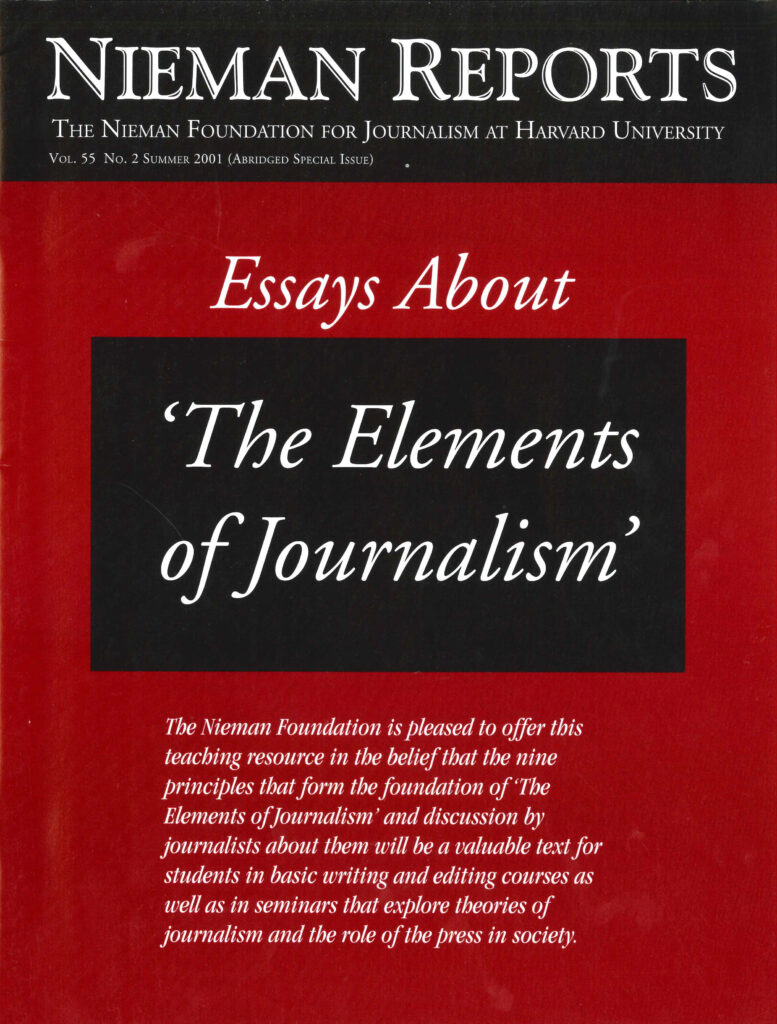In this electronic age, the most serious challenge to American journalism is the threat of becoming irrelevant. Unless the American print and broadcast press can demonstrate some unique service to the public, they will be overrun in time by cheaper, flimsier news competition.
The core purpose of the American press since its origin has been to serve as a watchdog for the public interest, guarding against the abuse of power. But with notable exceptions, that distinctive, essential function is now atrophying like a muscle, shrinking from lack of exercise.
When it has been true to its heritage, the press has sounded the alarm if public rights were being impaired. It marshaled public opinion to act against city, state, or federal authorities, or against any other group, public or private, found to be misusing the public trust.
How could such a vital function fall into widespread disuse? By not admitting that it has deteriorated. By pretending that it is being pursued. By focusing on minor abuses of power and avoiding the greater abuses. By making superficiality the norm for news coverage.
Watchdog reporting—when it is done well—extends basic reporting to a deeper level of intensity and thoroughness, without hobbling deadline pressure. It allows a reporter and editor time to think, to probe, and to analyze in a profession where the clock is often the prime adversary.
The failure of the press to be a public watchdog often goes unnoticed, but it can have devastating consequences. None was costlier than the total failure of the American press—and Congress—in August 1964, at the crucial point for expanding the war in Vietnam. Reporters like me were just beginning to probe skeptically the Johnson Administration’s claims about unprovoked attacks on U.S. destroyers in the Tonkin Gulf. Before anyone could unearth and assemble the facts, most U.S. newspapers (including mine, The Washington Post) editorially leaped to join the stampede that gave the administration a blank check for its covert war plans. By a combined Senate-House vote of 504 to 2, taken without public hearings, Congress yielded its responsibility to checkmate a massive abuse of executive power.
That monumental default of both press and Congress was seared into my consciousness. As a crowning irony, at the war’s end American public opinion blamed press criticism for undermining the United States’ war strategy, when the default was exactly the opposite. The press had failed to provide soon enough the kind of important evidence that citizens could have used to criticize it.
In “The Elements of Journalism,” Bill Kovach and Tom Rosenstiel write that in the American colonies “it was the watchdog role that made journalism, in Madison’s phrase, ‘a bulwark of liberty.’” But now Kovach and Rosenstiel report with dismay that journalism’s watchdog role has deteriorated into “diminution by dilution,” and this has happened through “overuse, and by a faux watchdogism aimed more at pandering to audiences than public service.”
Watchdog reporting is no gimmick, but requires a shift from rutted, traditional habits of the mind to open thought.
During the 2000 campaign, literally thousands of reporters walked right past the biggest story of the presidential election—the humiliating inadequacy of the voting equipment not just in Florida but across the nation. Where precincts used the antiquated ballot-punching machines, the error rate was a well-known disgrace glossed over by election managers until it crashed over the nation’s head. The lesson: News exists everywhere in the power structures that surround us. No reporter or editor worth their press passes should ever say, “There’s no news today.”
While Kovach and Rosenstiel focus on three investigative forms of watchdog reporting usually done by specialists, non-specialist alternatives are being explored by the Nieman Foundation’s Watchdog Journalism Project. Launched while Kovach was Nieman Curator, this initiative seeks to elevate all reporting to more intensive levels. The premise is that even the smallest newspaper or broadcasting station in any community should accept and pursue its watchdog obligation in the public’s interest. Wherever there is power, there is need for public accountability.
Walter Lippmann, early in his philosopher-journalist life, much like Madison had done, extolled newspapers as “the bible of democracy, the book out of which a people determines its conduct.” But as he grew older, he often criticized the press for failing to fulfill its potential. He never gave up hope, but near the end of his life he ruefully described journalism as “a refuge for the vaguely talented.” His characterization was painfully apt, but it need not remain valid forever. We, the vaguely talented, all bear the obligation to disprove it.
Murrey Marder, a 1950 Nieman Fellow and former Washington Post correspondent, created the Watchdog Journalism Project at the Nieman Foundation in 1997.
The core purpose of the American press since its origin has been to serve as a watchdog for the public interest, guarding against the abuse of power. But with notable exceptions, that distinctive, essential function is now atrophying like a muscle, shrinking from lack of exercise.
When it has been true to its heritage, the press has sounded the alarm if public rights were being impaired. It marshaled public opinion to act against city, state, or federal authorities, or against any other group, public or private, found to be misusing the public trust.
How could such a vital function fall into widespread disuse? By not admitting that it has deteriorated. By pretending that it is being pursued. By focusing on minor abuses of power and avoiding the greater abuses. By making superficiality the norm for news coverage.
Watchdog reporting—when it is done well—extends basic reporting to a deeper level of intensity and thoroughness, without hobbling deadline pressure. It allows a reporter and editor time to think, to probe, and to analyze in a profession where the clock is often the prime adversary.
The failure of the press to be a public watchdog often goes unnoticed, but it can have devastating consequences. None was costlier than the total failure of the American press—and Congress—in August 1964, at the crucial point for expanding the war in Vietnam. Reporters like me were just beginning to probe skeptically the Johnson Administration’s claims about unprovoked attacks on U.S. destroyers in the Tonkin Gulf. Before anyone could unearth and assemble the facts, most U.S. newspapers (including mine, The Washington Post) editorially leaped to join the stampede that gave the administration a blank check for its covert war plans. By a combined Senate-House vote of 504 to 2, taken without public hearings, Congress yielded its responsibility to checkmate a massive abuse of executive power.
That monumental default of both press and Congress was seared into my consciousness. As a crowning irony, at the war’s end American public opinion blamed press criticism for undermining the United States’ war strategy, when the default was exactly the opposite. The press had failed to provide soon enough the kind of important evidence that citizens could have used to criticize it.
In “The Elements of Journalism,” Bill Kovach and Tom Rosenstiel write that in the American colonies “it was the watchdog role that made journalism, in Madison’s phrase, ‘a bulwark of liberty.’” But now Kovach and Rosenstiel report with dismay that journalism’s watchdog role has deteriorated into “diminution by dilution,” and this has happened through “overuse, and by a faux watchdogism aimed more at pandering to audiences than public service.”
Watchdog reporting is no gimmick, but requires a shift from rutted, traditional habits of the mind to open thought.
During the 2000 campaign, literally thousands of reporters walked right past the biggest story of the presidential election—the humiliating inadequacy of the voting equipment not just in Florida but across the nation. Where precincts used the antiquated ballot-punching machines, the error rate was a well-known disgrace glossed over by election managers until it crashed over the nation’s head. The lesson: News exists everywhere in the power structures that surround us. No reporter or editor worth their press passes should ever say, “There’s no news today.”
While Kovach and Rosenstiel focus on three investigative forms of watchdog reporting usually done by specialists, non-specialist alternatives are being explored by the Nieman Foundation’s Watchdog Journalism Project. Launched while Kovach was Nieman Curator, this initiative seeks to elevate all reporting to more intensive levels. The premise is that even the smallest newspaper or broadcasting station in any community should accept and pursue its watchdog obligation in the public’s interest. Wherever there is power, there is need for public accountability.
Walter Lippmann, early in his philosopher-journalist life, much like Madison had done, extolled newspapers as “the bible of democracy, the book out of which a people determines its conduct.” But as he grew older, he often criticized the press for failing to fulfill its potential. He never gave up hope, but near the end of his life he ruefully described journalism as “a refuge for the vaguely talented.” His characterization was painfully apt, but it need not remain valid forever. We, the vaguely talented, all bear the obligation to disprove it.
Murrey Marder, a 1950 Nieman Fellow and former Washington Post correspondent, created the Watchdog Journalism Project at the Nieman Foundation in 1997.



